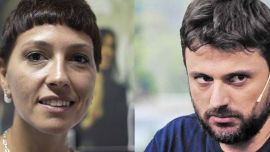The vast majority of the adult population in Israel has military training. Nearly four million, out of over nine million – that is, almost half of all citizens in the country – are available and fit to go to war.
Israel as a country is open to receiving Jewish immigrants from all over the world, as its Declaration of Independence (1948) declares. That is why every year Olims (what migrants are called) in their thousands arrive in Israel from all over, wishing to “return home.”
Among those recently arrived there is an increasing number of Argentines wishing to make Aliyah (settle in Israel). As Israeli citizens, they may enjoy all the rights afforded by the nation, and must meet all the obligations required of them. One of them, when of age, is mandatory military service. Another one is to go to war.
—
Jonas Ariel Kan is in the north of Israel. He is part of a unit that has trained to enter Lebanon.
“I’m not linked to Gaza. My family can’t know my exact location for safety reasons, both for the country and for them. And so I don’t worry about them. Two of my friends were beheaded at the festival on October 7, so I feel prepared. If I fall at the hands of the enemy, my fate could be very bad,” he stated.
Jonas has lived in Israel since 2014, when he was 18 years old. He studied at the ORT Jewish school. During his mandatory service, he served as a commander and a sergeant first with 17 soldiers under his command. Within his unit, which consists of several “sections,” the only non-Israelis are himself, two Ukrainians and one Peruvian.
“We’re all from the Jewish community. I study the Kabbalah and Germara (Talmud) in Aramaic a lot. I understand there is a God above us,” he said.
“You can be the happiest person, but when you have to defend your homeland, you do it to your last drop of blood and whatever the cost. Without an Army, the world would destroy us in one day. If you don’t defend your beliefs, then history speaks for itself: the world tries to turn off the lights and attack successful minorities,” explains Kan.
“We don’t attack; Judaism is love and a connection with the world. We defend ourselves. If anyone dares do something to us, we do something [back], wherever they are. Believe me, the community will get to that person, sooner or later. Whoever isn’t interested in robbing us, mutilating us or raping our women is always welcome in our homes. Whatever their colour or ideology,” he held.
The soldier – or Chayal in Hebrew – recalls the tragic murder of his rabbi, Rubén Birmajer, in 2015. A student of the Torah, and an Argentine, Birmajer was stabbed while leaving the Old Town in Jerusalem.
“I have friends who were brutally murdered – there’s the death of my rabbi, we went through the Holocaust and so much more. It’s about defending your homeland, your dad, your mum, your heritage. If we don’t do it, then they do blood-curdling things on the other side. The word itself says it all: terrorism brings terror to the world.
“There are people who fight and give it their all to fight against those entities, whatever the price they have to pay to defend themselves and eliminate them. It’s a war between light and darkness, therefore it matches our religion perfectly. I mean it: I don’t care if I die defending the home where my dad lives now,” stated Kan.
—
Nicolás Wergifker is taking advantage of a two-day furlough to answer questions for this article. His mandatory service ended in 2018. After finishing his training, he settled in Argentina. Because he lived in another country, he had a special permit not to be called up as a reservist, but Hamas’ bloody attack on Israel changed everything.
“On October 7, when all of that happened, the first thing I did was call the Army. ‘I want to join,’ I told them. I felt terrible anger, like the entire people of Israel. I don’t know how to put my emotions into words because nothing similar ever happened to me in Argentina,” he explains.
“I felt I lived in the safest country in the world, where nothing would ever happen. When I got to Israel, I even lived in one of the kibbutzim they attacked. When they released some of the hostages, they included some of those kidnapped from that kibbutz where I spent my first few months. I couldn’t believe it,” he said in an interview.
One month later, on November 7, he was finally called up: “ I went gladly. It’s my home and I feel the moral need to defend it. I joined the reserve unit of people who were in my unit when we did mandatory service. There are people aged 36 to 24. Now I’m in a kibbutz two kilometres away from Gaza. We work inside and outside the Strip, without returning home for weeks.”
Nicolás is 26 years old and he arrived in Israel when he came of age. He’s Argentine, originally from Salliqueló, Buenos Aires Province, and his whole family is today in Mendoza.
“Israel is a country that is often at war; it’s the only democracy in the Middle East; the only one among so many Arab countries. Since I did mandatory service I knew one day this would happen. My unit has soldiers who saw action in the 2006 Lebanon War, and the 2014 Gaza conflict. If you ever fought, that’ll happen in some war,” he said.
“Regarding safety: we’ll get it back. I don’t think things are under control; when this Gaza thing blows over another problem will start in the north, but we’ll be there,” he vowed.
—
“My name is Natan De Leo, I’m 34 years old. I’m from La Plata, I support Gimnasia La Plata, I studied film. I’ve worked in Argentina, and now in Israel, as a director’s assistant in the film industry and TV series. In parallel, I’m a reservist for the Israeli Army,” says another soldier, introducing himself.
“I moved to Israel in early 2016. I travelled here in 2014 and I fell in love. During that trip I discovered how spectacular this country is and that it is much more than wars, terrorist attacks, the desert and the Wailing Wall. In 2016, I had the chance to take a six-month course and get to know the country better. Then I decided to stay and start the process to get my Israeli citizenship,” recalls Natan.
“On October 7, when the war started after Hamas’ invasion in Israeli territory, it was a Saturday, the Shabbat, and also a holiday. I was sleeping in my flat and the anti-missile sirens woke me up. In the course of the morning they went off in my town and different parts of the country. That very day, at noon, I received the message to join the ranks of the Army. I’m a soldier and because of the laws of the Army I can’t exactly specify my role,” he recalled, explaining some of his reluctance.
Dual nationality is a part of Natan’s life. On either side, there is love for Argentina and Israel – he describes himself as “half-Argentine, half-Israeli.”
“I was born and raised in Argentina until I was 26, my family are still there and I try to visit them once a year. [But] I’ve been living in Israel for eight years now, and I feel like an Israeli. This is my home today,” he said in an interview.
“People who don’t know me here realise I’m an Argentine straight away, because I speak Hebrew with an accent! They see me with my mate everywhere, in the Army or at work, and little by little I’ve been introducing it to Israelis. I go to the Army with my Gimnasia La Plata jerseys,” De Leo admitted.
—
“When all of this started, I didn’t hesitate to call my commander to know where to go. It was a desperate situation and there was no time to think too much: there were people being kidnapped and the country was being constantly attacked,” explains Lucas Joaquín breathlessly.
Twenty-five years old, he decided to volunteer to join the Israeli Defence Forces three years earlier.
“The fact that I was born in Argentina doesn’t take away from the fact that Israeli is my home, too. This country welcomed me with open arms, it even helped and encouraged me to expect nothing in return,” he explains.
“People here made me feel like family. I met so many people who as soon as they knew that I was on my own wanted to take me in as one of their own, whether by inviting me to spend Shabbat with them or by offering me a hand for anything I needed,” he added. “I think because of all that and more I can safely say that Israel is my home.”
Ezequiel Trzcina agrees. He is answering questions from a bed in an Israeli hospital as he recovers after being shot in an arm. After an operation, he is slowly recovering.
He was born in Buenos Aires but has lived in Israel for the last three years. He migrated when he was 23 and volunteered for the Army. He trained for 24 months and was a combatant in the paratrooper unit (Tzanchanim in Hebrew).
It had been four months since he had been, in his own words, released. “When the war started, I saw the news, got on a bus and went to the base, without waiting for a call. I was getting ready, I went through the Kibbutzim and on November 4, I entered the Gaza Strip,” he reveals.
“On November 15, I was shot in the arm while on a mission. My unit entered a building and another soldier and I were asked to stay outside to protect the tanks. While on duty, I got shot,” Trzcina said.




















Comments